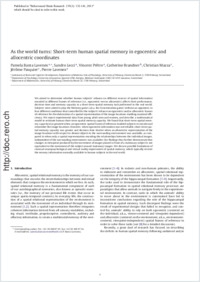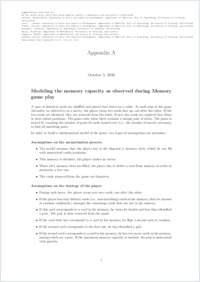As the world turns: short-term human spatial memory in egocentric and allocentric coordinates
- Banta Lavenex, Pamela A. Laboratory of Brain and Cognitive Development, Department of Medicine, Unit of Physiology, University of Fribourg, Switzerland
- Lecci, Sandro Laboratory of Brain and Cognitive Development, Department of Medicine, Unit of Physiology, University of Fribourg, Switzerland
- Prêtre, Vincent Laboratory of Brain and Cognitive Development, Department of Medicine, Unit of Physiology, University of Fribourg, Switzerland
- Brandner, Catherine Department of Psychology, University of Lausanne, Switzerland
- Mazza, Christian Department of Mathematics, University of Fribourg, Switzerland
- Pasquier, Jérôme Department of Mathematics, University of Fribourg, Switzerland
- Lavenex, Pierre Laboratory of Brain and Cognitive Development, Department of Medicine, Unit of Physiology, University of Fribourg, Switzerland
-
12.01.2011
Published in:
- Behavioural Brain Research. - 2011, vol. 219, no. 1, p. 132-141
English
We aimed to determine whether human subjects’ reliance on different sources of spatial information encoded in different frames of reference (i.e., egocentric versus allocentric) affects their performance, decision time and memory capacity in a short-term spatial memory task performed in the real world. Subjects were asked to play the Memory game (a.k.a. the Concentration game) without an opponent, in four different conditions that controlled for the subjects’ reliance on egocentric and/or allocentric frames of reference for the elaboration of a spatial representation of the image locations enabling maximal efficiency. We report experimental data from young adult men and women, and describe a mathematical model to estimate human short-term spatial memory capacity. We found that short-term spatial memory capacity was greatest when an egocentric spatial frame of reference enabled subjects to encode and remember the image locations. However, when egocentric information was not reliable, short-term spatial memory capacity was greater and decision time shorter when an allocentric representation of the image locations with respect to distant objects in the surrounding environment was available, as compared to when only a spatial representation encoding the relationships between the individual images, independent of the surrounding environment, was available. Our findings thus further demonstrate that changes in viewpoint produced by the movement of images placed in front of a stationary subject is not equivalent to the movement of the subject around stationary images. We discuss possible limitations of classical neuropsychological and virtual reality experiments of spatial memory, which typically restrict the sensory information normally available to human subjects in the real world.
- Faculty
- Faculté des sciences et de médecine
- Department
- Département de Médecine, Département de Mathématiques
- Language
-
- English
- Classification
- Biological sciences
- License
-
License undefined
- Identifiers
-
- RERO DOC 27189
- DOI 10.1016/j.bbr.2010.12.035
- Persistent URL
- https://folia.unifr.ch/unifr/documents/302034
Other files
Statistics
Document views: 142
File downloads:
- pdf: 300
- Supplementary material: 177

